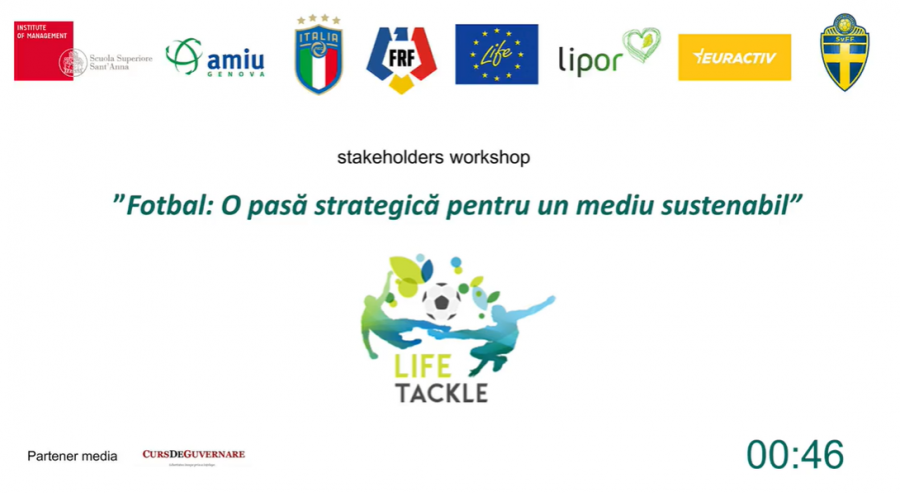The workshop was part of the National Awareness Initiatives of LIFE TACKLE, through which the partner federations disseminate information and awareness on the project’s achievements.
The debate was chaired by Florin Sari, Social Responsibility and Good Governance Manager of FRF. A group of high-profile speakers took part in the debate:
- Nicolae Stefanuta,, Member of the European Parliament/Renew Europe Group;
- Thomas Moldovan, Secretary of State of the Ministry of Sports;
Lucian Mircescu, former leader of the Romanian delegation on sports, on the occasion of the Romanian Presidency of the Council of the European Union;
- Florian Nuta, vice-Rector of Danubius University in Galati.
After the introductory greetings from the director of the Sports Museum, the agenda included a presentation of the activities and results of the LIFE TACKLE project in Romania, followed by a round table focused on the debate on “how to make football events more environmentally friendly”.
The importance of better planning and combined action for improving the impact of football matches and football activities in general on the environment was stressed: each participant (from players, to supporters, to service providers, to stadium managers, to local government) has a responsibility in making football more sustainable. Through the LIFE TACKLE project, the Romanian Football Federation has achieved some important results in terms of environmental sustainability, including:
- a feasibility study for renewable energy at the Voluntari stadium;
- the promotion of "green" public purchases and targeted courses on this topic for the Federation’s members;
- the distribution of reusable cups during national team matches for reducing single-use plastics and the replacement of broken seats with seats made of recycled plastics at the National Arena;
- the installation of LED lights and renewables at the Steaua, Rapid and Arcul de Triumf stadiums;
- the installation of LED lights on the 150 large bases and 100 small plots of land for the CNI program.
During the round table debate, other important topics were addressed by the speakers, including: the digitalization of sports (e.g. the introduction of sensors that notify when the recycling bins are filled, plus information about the volume and type of waste, their type, sensors for saving gas and electricity in stadiums etc.); the role of athletes in increasing awareness and social responsibility on environmental issues through their public reputation and credibility; the importance of replicating successful environmental practices in other stadiums; the importance of thinking in a systemic way when planning a sporting event (starting from when the spectators leave home to reach the stadium, the route they take, the management of the event, up until when the spectators leave the stadium).
















Follow our journey